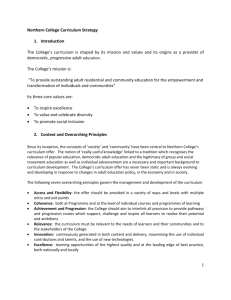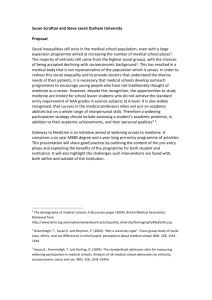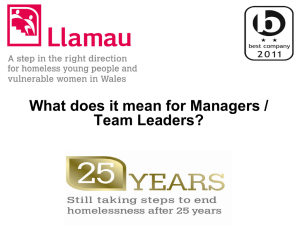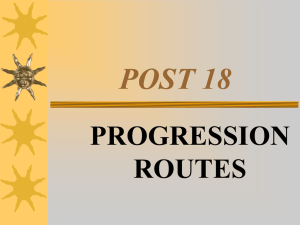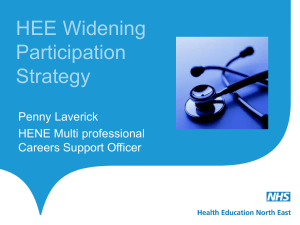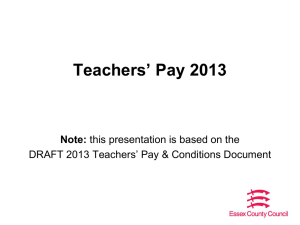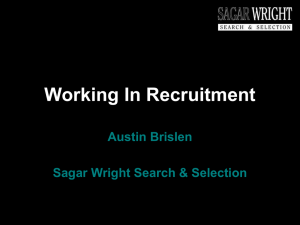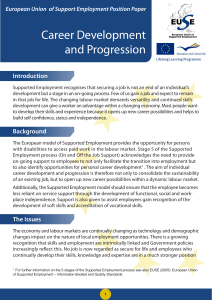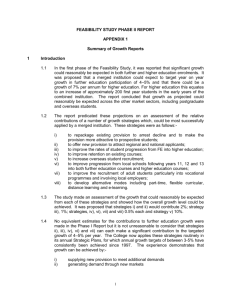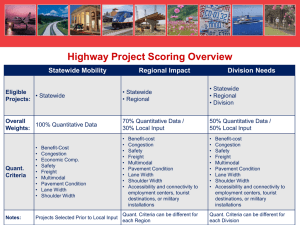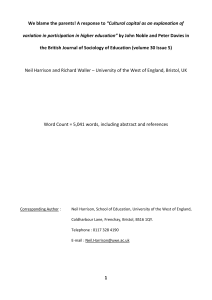Big Presentation - Department for Employment and Learning
advertisement
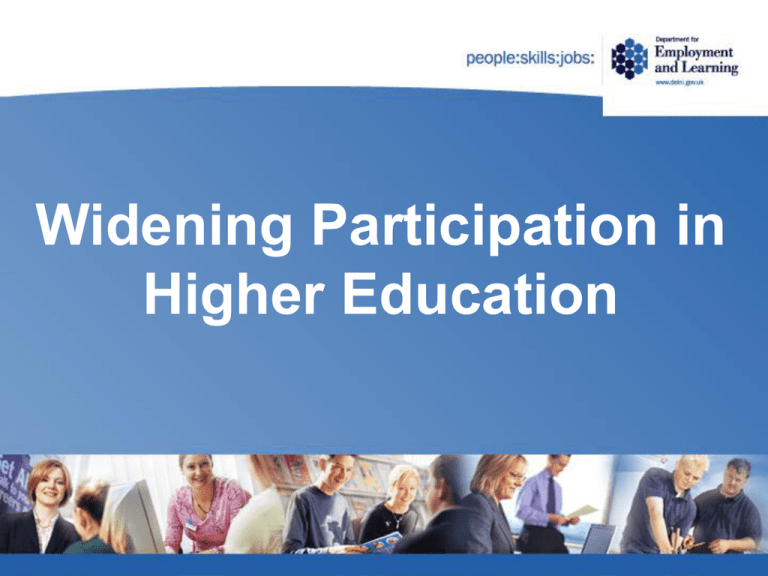
Widening Participation in Higher Education Professor Denise McAlister University of Ulster Targets Outcome for the Targets Group “A prioritised list of the under represented groups to be targeted by the Widening Participation Regional Strategy together with a range of time related goals for participation rates for each group.” Considerations and work of the group to date have included: Statistical analysis of HE participation in Northern Ireland Specific areas explored to date have included: • • • • • • • Socio-economic classification Deprivation Religion Ethnicity Age Disability Geographical location of HE participation Considerations and work of the group to date have included: Rationale for targeting WP resources and activity needs to consider: • • • • Targeting resources for maximum impact Focussing on those groups where there are low rates of HE participation How WP activities can best work together to support HE learner progression Developing the monitoring and data capacity to support the regional WP framework. Emerging Questions and Issues Are there missing target groupings from the areas listed? How specified do the target groupings need to be for operational purposes? How important is it to frame any final numerical targets against, for example, changing demographics and changes in HE? What other factors or issues should the group consider in its future work? How might success be measured? Deirdre Gillespie Department of Education Aspiration and Attainment Solutions Key Barriers to Attainment & Aspirations Institutional Situational Barriers Poor Levels of Attainment Literacy/Numeracy difficulties Peer pressure and cultural norms Reluctance to leave geographical and other ‘comfort zones’ Physical access – rural access /public transport infrastructure Challenges for Adult Returners (Family responsibilities, working patterns, lack of time, benefit entitlement) Dispositional Barriers Low self-esteem Alienation from family Lack of confidence, motivation & fear of failure Unstable home circumstances Poor past educational experiences Outdated perceptions of the educational sector Resistance to learning Attitudes related to social class or gender roles No tangible rewards Lack of suitable role models. Institutional Barriers Lack of articulated progression routes Irrelevant/inflexible curriculum Mode of provision Inflexible entrance requirements Meritocratic application and admissions systems Intimidating facilities/buildings Stigmatisation Informational Barriers Poor access to high quality careers education provision Poor quality pre-entry information, advice and guidance Lack of awareness of benefits of further and higher education Lack of access to prospectus material due to low levels of literacy & numeracy Financial Barriers Costs – direct, indirect (transport and child-care) Opportunity costs of forgone income Debt aversion – need to develop financial literacy Limited discretionary grants Other Barriers Lack of awareness of the needs of targeted groups Integrated multi-agency approach Employer support Key Question What could help learners overcome these barriers in order to achieve their full potential and consider the relevant progression opportunities? Moving Forward ATTAINMENT Raising Expectations Broadening Horizons Level of Achievement Clear Progression Pathways Information, Advice & Guidance ASPIRATION Early Intervention High Quality Teaching & Learning Relevant & Affirming Curriculum Structured Learning Support Linking with Key Partners Wilma Fee Queen’s University Belfast Enhancing Recruitment and Selection Two Guiding Principles Widening Participation is not about lowering standards Higher Education provision Northern Ireland covers University, University College and Regional Colleges Focus of Group Evaluating Methods of Recruitment Evaluating Methods of Selection Identifying Parameters for Enhancement Measuring Impact CONTEXT - Infrastructure Swartz Report (2004) National Student Forum (2008) IUSS Select Committee Report - Students and Universities (2009) Unleashing Aspirations: Report on Fair Access to the Professions (2009) Role of Supporting Professionalism in Admissions (SPA) CONTEXT – Regional Is there a problem? If so, where does it lie? Solutions need to be target-focussed Solutions need to be measurable Identifying Targets Overlap Work of Targets Group Assumption: SECs 5-7 Male Protestant Youth Disability Adult Returners Work-based Learners Enhancing Recruitment Raising Aspirations – Targeted Activities Queen’s University of Ulster - Discovering Queen’s Step Up Realising Opportunities Project – HEFCE-funded 13 research intensive universities Compact Schemes Texas 10% Role of careers, information advice and guidance Enhancing Selection Are there qualifications barriers? • Statistical evidence e.g. 14.7% progress to HE from Secondary Schools 74.2% progress to HE from Grammar Schools How are these to be addressed? • • • • • • Adjustment period Contextual Data Selection using non-cognitive processes (SATs mini interviews) Vocational Qualifications Qualifications and Credit Framework APEL Issues or Questions 1. Widening Participation is not about lowering standards of entry. What are the barriers for more inclusive recruitment and selection for target groups? 2. Are there interventions at stages not being optimized? a) b) c) d) e) 3. Primary Post-Primary Post-16 Adult Learning Work-based learning What should the role of employers be in supporting training and education opportunities for progression to HE? Issues or Questions (continued) 4. Is there a shared view that contextual data should be adopted in the areas of: • • Hard data supplied by DEL/DE Soft data in applications How does this relate to Section 75? 5. Should alternative access routes to HE be enhanced? • • • • 6. Access programmes New routes for disengaged youth (NEET) Foundation Degrees Other Should quotas be set for participation levels in HE (as in the Republic of Ireland)? Dr Damian O’Kane University of Ulster Improving Retention and Progression Membership of Group Suzanne Gray Belfast Metropolitan College Heather Laird Open University Joan McCombe St Mary’s University College Dorothy Mclwee North-West Regional College Dr Damian O’Kane University of Ulster Professor Colin Trotman DACE, Swansea University Paul Walsh South-Eastern Regional College DEL: Kieran Mannion; Peter Martin; Thomas Coyle Terms of Reference To identify those groups who are least likely to be retained, progress and achieve Higher Education qualifications To identify the possible barriers to completion among the target groups To identify ways in which the target groups can be supported to successfully complete Higher Education programmes To provide guidance on a regional approach to the improvement of retention, progression and completion among the target groups To identify those groups who are least likely to be retained, progress and achieve Higher Education qualifications Lower Socio-Economic Class (SEC) Gender - Males Disability - Likelihood increases with year of course Age - Adult Learners Religion – Catholics Are there other groups/sub-groups that we should be considering? To identify the possible barriers to completion among the target groups (Personal, Social, Academic interaction) Financial Parental Education Subject Studied – STEM Subjects higher drop-out Qualification on Entry – Misalignment of teaching strategies Pre-Entry preparation – inadequate info, Interest in subject Post Entry Support – Social and Academic Integration What barriers are there to completion among the target groups? To identify ways in which the target groups can be supported to successfully complete Higher Education programmes What can Government do? Policies Target Setting Funding What can HE/FE Institutions do? Academic & Pastoral Support What can other stakeholders do? Schools Careers Service Community Organisations How do we improve retention and progression among the target groups? Post Entry Support – Social and Academic Integra Specific Issues for Consultation (1) Are there other groups/sub-groups that we should be considering? (2) What barriers are there to completion among the target groups? (3) How do we improve retention and progression among the target groups? What can Government do? What can HE/FE Institutions do? What can other stakeholders do? Widening Participation in Higher Education If you have any further comments please contact the Widening Participation team on 028 9025 7745
